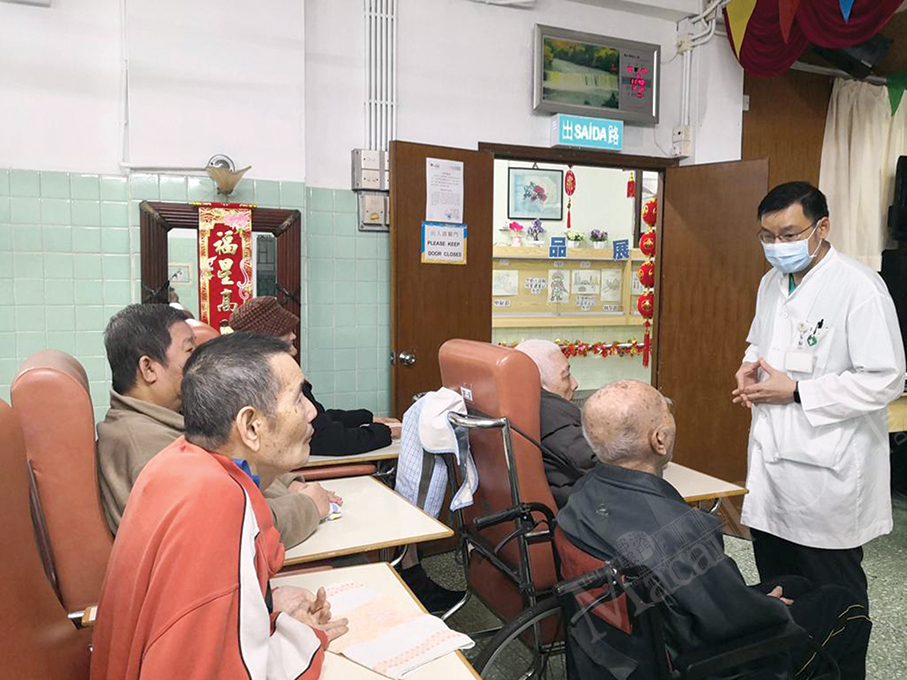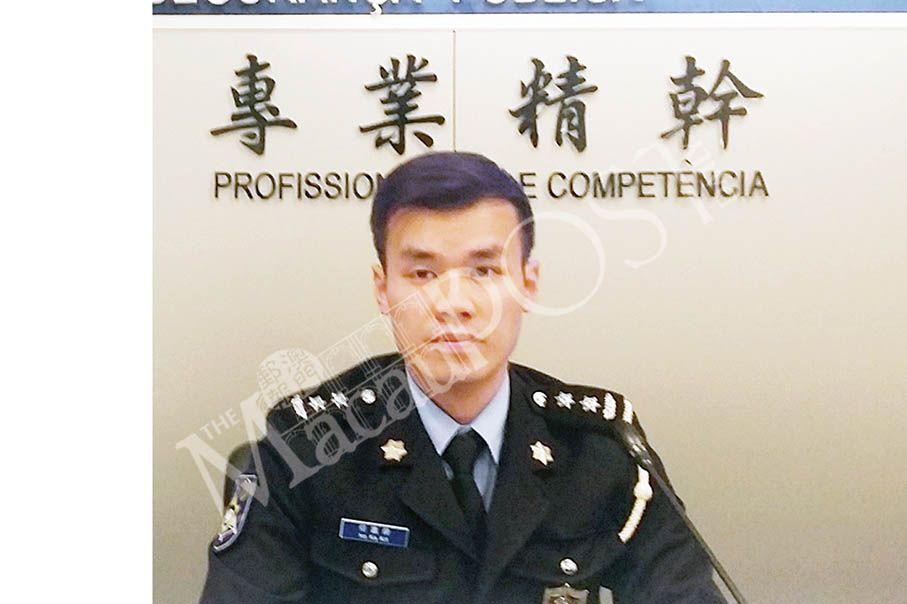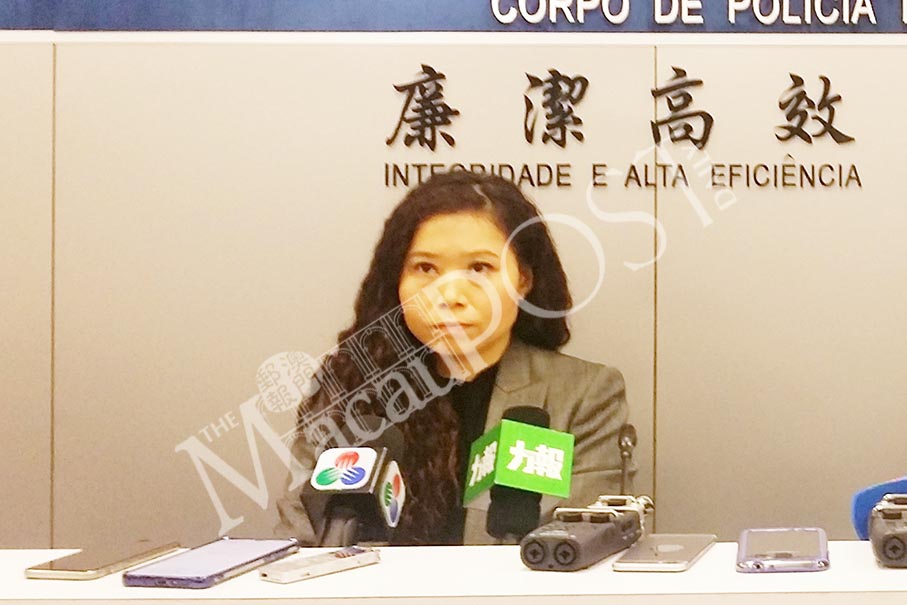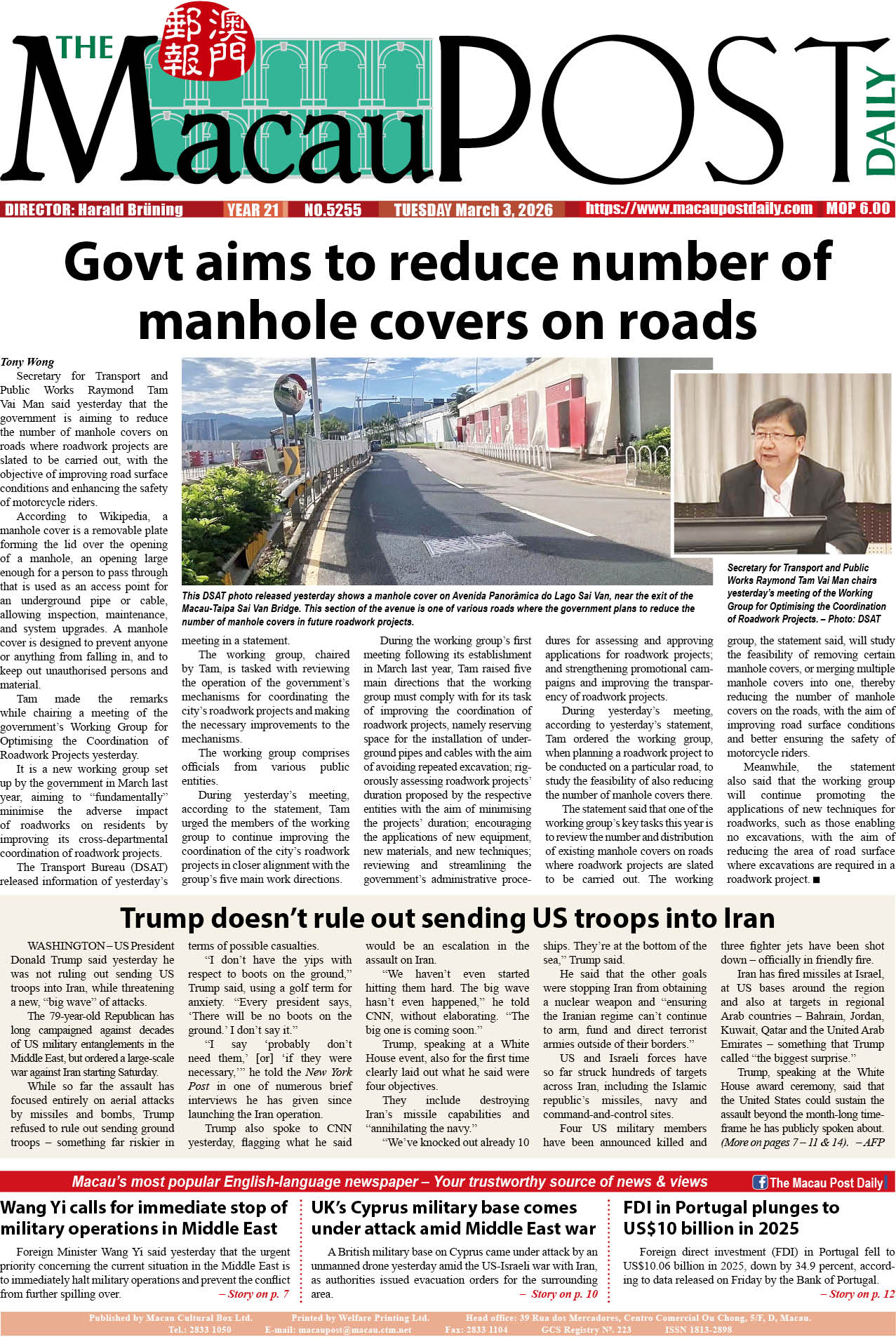The Novel Coronavirus Response and Coordination Centre announced last night that a local man who returned to Macau on Saturday from Turkey via the United Arab Emirates (UAE) and Singapore has tested positive for COVID-19.
The centre has classified the case as imported and asymptomatic, because of which it has not been added to Macau’s novel coronavirus tally, which therefore remains at 79.
The centre identified the male patient as a 55-year-old who received his first and second mRNA jab in Macau in April and May respectively, before receiving a mRNA booster jab in Turkey in December.
According to a statement by the centre, the man tested negative for COVID-19 in a nucleic acid test (NAT) in Dubai on Thursday last week. He flew to Singapore the next day and caught a connecting flight from Singapore to Macau on Saturday.
The man tested negative for the novel coronavirus upon arrival at the local airport, after which he was transferred to the Treasure Hotel – one of the government’s “quarantine hotels” – for medical observation. He still tested negative for COVID-19 in two follow-up tests, on Sunday and Monday. However, according to the statement, he “weakly” tested positive for the novel coronavirus in a follow-up test on Tuesday night.
Consequently, the statement said, the man was transferred by a Fire Services Bureau (CB) ambulance to the Health Bureau’s (SSM) Public Health Clinical Centre in Coloane yesterday morning, where he underwent a follow-up test which came up with a negative result again.
According to the statement, the man, who had still not come down with any COVID-19 symptoms as of last night, told Health Bureau officials that he had never been diagnosed with the novel coronavirus disease.
Post-CNY COVID-19 threat
Meanwhile, the centre yesterday urged public entities, local companies and other organisations to strictly stick to the Health Bureau’s guidelines for their employees, with the aim of preventing the post-Chinese New Year occurrence of new local COVID-19 cases in Macau, in the wake of the current novel coronavirus wave in Hong Kong and in various provinces, autonomous regions and municipalities in the mainland.
Another statement by the centre last night noted that according to the guidelines, officially known as Recommendations for Organisations on Management of Workers, employers or managers should have a good understanding of their staff members’ travel history and contact history, and constantly monitor their state of health.
According to the guidelines, which have bee released on the Health Bureau’s COVID-19 website, all types of entities and organisations should ensure that their staff members and outsourced workers always report their travel history and contact history within the past 21 days, such as by requiring them to generate their Macau Health Code every working day before entering their workplace.
According to the guidelines, organisations should check their staff members’ temperature “if conditions permit”. Employers should tell staff members who have come down with a fever or other respiratory symptoms to wear a facemask and see a doctor promptly.
Meanwhile, last night’s statement also urged those who have recently visited Shenzhen or other areas in the mainland outside Guangdong to book a follow-up COVID-19 test. They should undergo the follow-up test four to seven days after their latest test before entering Macau. According to the statement, they can book the free test on https://app.ssm.gov.mo/mandatoryrnatestbook, but the negative result of the test will not be displayed on the Macau Health Code, meaning that it cannot be used for crossing the checkpoints.
The statement also underlined that a high percentage of people infected with the Omicron variant, which is widely spreading across the world, are asymptomatic or just come down with mild symptoms, because of which, the statement said, those who have come down with symptoms such as fever, headache, fatigue, cough, sore throat, nasal congestion, runny nose, and reduced sense of taste or smell, should see a doctor and undergo a COVID-19 nucleic acid test as soon as possible, particularly those who develop the symptoms at around the same time as their family members, colleagues, classmates or friends, or those who come down with the symptoms after visiting somewhere outside Macau or having been in contact with those who have entered Macau.
Govt completes outreach jabs in 36 social service residential facilities
Meanwhile, the centre said in another statement last night that the Health Bureau, in collaboration with the Social Welfare Bureau (IAS) and the private Kiang Wu Hospital, has carried out outreach COVID-19 vaccination services in 36 retirement homes and rehabilitation homes since October 25.
The statement underlined that when health workers visit retirement homes for on-site COVID-19 vaccinations, they will answer questions raised by the senior citizens concerning their respective state of health, with the aim of encouraging them to receive the on-site jabs. The statement said that the government will constantly carry out its outreach COVID-19 inoculation services for retirement homes and other types of social service residential facilities.
Over 30 pct of eligible individuals receive booster jabs
Meanwhile, the Health Bureau said earlier this week that over 30 percent of eligible potential vaccinees had received their COVID-19 booster jab.
Leong Iek Hou, who heads the bureau’s Communicable Disease Prevention and Control Division, made the remarks in an interview with public broadcaster TDM.
Macau’s COVID-19 booster vaccination programme covers all those aged 18 or over who have been fully (twice) inoculated with COVID-19 inactivated vaccines or mRNA vaccines at least six months ago.
Both types of COVID-19 vaccines currently available in Macau, China’s Sinopharm inactivated vaccine and Germany’s BioNTech mRNA vaccine, are two-dose vaccine.
As of Sunday, according to Leong, around 240,000 people in Macau were eligible to receive a COVID-19 booster jab, about 75,750 of whom had already received the booster shot, representing a booster inoculation rate of 31.6 percent.
Leong underlined that the antibody levels of those who have received two COVID-19 jabs will gradually drop as time passes, because of which their immunity to COVID-19 infection or ability to prevent themselves from suffering a serious condition or dying from the novel coronavirus disease will decline. Leong said that a booster jab is able to effectively raise the COVID-19 antibody levels.
Recommending mRNA booster jabs
According to Leong, the World Health Organisation (WHO) has said that those who choose an mRNA jab as their booster shot after receiving two shots of inactivated vaccines will develop a higher level of immunity against the novel coronavirus than those choosing to stick to an inactivated jab as their booster shot.
The Chinese Centre for Disease Control and Prevention (CCDC) under the National Health Commission (NHC), Leong said, has also advised that those who have had two shots of inactivated vaccines will develop stronger immunity against COVID-19 if they choose to “mix and match” their booster shots, compared to choosing to stick to an inactivated jab.
Leong also said that Hong Kong’s Department of Health (DH) has also recommended that people receive an mRNA jab as their booster shot, regardless of having been fully inoculated with inactivated vaccines or mRNA vaccines.
Leong said that normally those who have been fully (twice) inoculated against COVID-19 are willing to receive a booster jab. However, Leong said, some residents in Macau mistakenly think that there is no urgent need to receive a booster dose as the city is currently not hit by local COVID-19 cases. Leong warned that Macau is still facing the COVID-19 threat due to the ongoing pandemic globally.

This undated handout photo released yesterday shows a doctor answering questions from senior citizens during an outreach COVID-19 vaccination session in a retirement home. Photo: GCS








